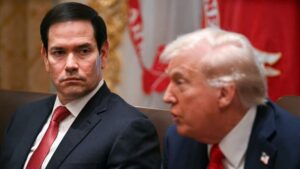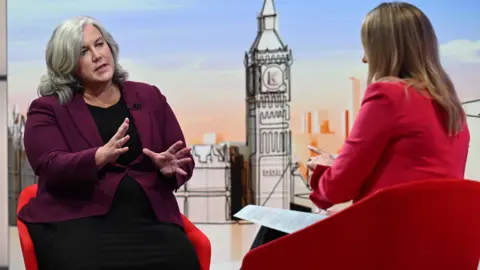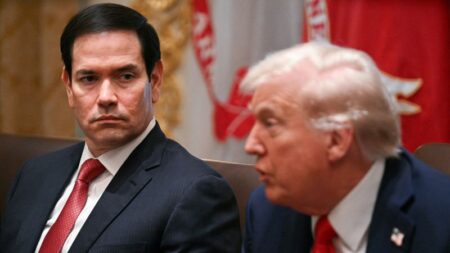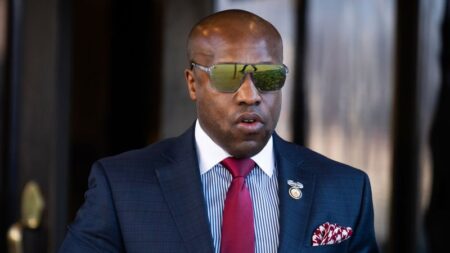In a recent statement, Transport Secretary Heidi Alexander firmly addressed rumors that leaks related to the upcoming Budget have adversely affected the economy. Her remarks follow widespread criticism suggesting that ongoing speculation surrounding potential tax increases is contributing to a state of paralysis among businesses and consumers. Alexander’s statement is particularly significant in light of recent analyses that point to a stall in economic growth.
Over the past few months, various media outlets have been rife with speculation regarding possible tax hikes. Several options have been floated by the government, raising concern among economic observers. Observing this climate, former Bank of England chief economist Andy Haldane stated during an interview on the BBC’s “Sunday with Laura Kuenssberg” that the ongoing uncertainty is the “single biggest reason why [economic] growth has flatlined.”
In her defense, Alexander emphasized that speculation in advance of financial announcements is commonplace. She highlighted the Chancellor’s clarity regarding the government’s priorities, suggesting that the forecasts and plans remain stable. Chancellor Rachel Reeves is anticipated to announce significant increases in taxes to address a multibillion-pound shortfall within her spending agenda during the forthcoming Budget presentation scheduled for Wednesday.
Recent statements from government officials have signaled that increases to income tax rates might be on the table, despite initial assertions to the contrary, particularly following Labour’s election promise against raising such taxes. While some sources hinted that these tax increases would be in the works, indications from last week suggested that better-than-expected economic forecasts might have led Reeves to reconsider these measures.
Further complicating the situation, governments often leak information related to budgetary plans intentionally. This tactic serves several purposes, including gauging public reaction or preparing markets for forthcoming announcements. Nevertheless, the steady stream of such leaks has raised eyebrows and prompted calls for an inquiry from opposing parties. The Conservative Party, in particular, has voiced serious concerns, asserting that these disclosures could have tangible effects on financial markets.
Amidst this backdrop of uncertainty, Haldane labeled the ongoing speculation a “fiscal fandango,” claiming it burdens the economy and breeds stagnation among businesses and consumers alike. He further criticized the lengthy and “leaky” process of Budget planning, noting its degradation over the years. Under scrutiny, Alexander passionately responded, urging people to refrain from drawing conclusions until the official Budget is unveiled.
Her defense of the government’s approach included acknowledging challenging global economic conditions and declines in productivity estimates that influenced budgetary decisions. Echoing calls for integrity, Conservative MP Mel Stride has addressed Treasury officials regarding the ramifications of these leaks, highlighting significant questions around the authorization of such disclosures.
The Chancellor’s forthcoming Budget is expected to introduce various smaller tax increases while potentially avoiding the contentious issue of income tax hikes. However, the possibility remains for the government to continue freezing income tax thresholds, raising concerns that any salary increments could lead to higher taxes for a broader swath of the population, effectively imposing new tax burdens upon them.
Amid these fiscal implications, Reeves has affirmed a commitment focused on alleviating the cost-of-living crisis, with plans to freeze rail fares in England—an unprecedented move in recent history. Additionally, goals to reduce NHS waiting lists and tackle national debt have been outlined, signaling the administration’s priorities amid fiscal challenges.
One of the more controversial discussions is the two-child benefit cap, which limits welfare claims to the first two children. Pressure from within Labour circles persists to remove this cap, potentially leading to expenditures exceeding £3 billion. Alexander, while noncommittal on immediate actions regarding the cap, emphasized that the Labour Party is fundamentally rooted in combatting child poverty, stating that children’s futures should not hinge on their family’s financial situation.
The Conservative stance opposes this removal, with Stride emphasizing fairness, articulating that those on welfare should be subject to the same financial considerations as other families. As discussions around the Budget advance, it becomes evident that the crucial decision lies in whether Reeves will maintain control over government spending or resort to tax increases that could deter economic progress.
Furthering this debate, Green Party leader Zack Polanski has pushed back against potential financial strains on average citizens, advocating for higher taxes on the affluent instead of burdening lower-income households. As the Budget approaches, the discourse continues to reflect divergent economic philosophies and political strategies aimed at addressing pressing fiscal challenges.











